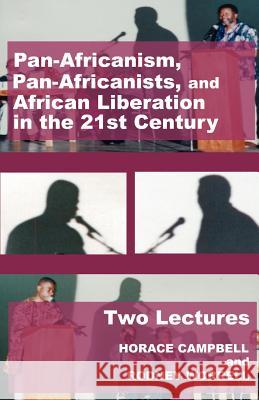Pan-Africanism, Pan-Africanists, and African Liberation in the 21st Century: Two Lectures » książka
Pan-Africanism, Pan-Africanists, and African Liberation in the 21st Century: Two Lectures
ISBN-13: 9780977790876 / Angielski / Miękka / 2006 / 184 str.
Professor Horace Campbell, a veteran Pan-Africanist scholar, and Rodney Worrell, a young, organic intellectual, address some of the burning issues of Pan-Africanism. The publication is a hard hitting, provocative, and enlightening discourse and a road map for the way forward.
In this small work Professor Horace Campbell the veteran Pan-Africanist scholar and Rodney Worrell a young organic intellectual address some of the burning issues of Pan-Africanism. The publication is a hard hitting, provocative and enlightening discourse on Pan-Africanism. It is also a road map for the way forward. Join Campbell on this journey as he engages the attention of the reader on a number of important issues : Africa and International Partnerships, defining the task of the 21st century, retreating from the mechanical concepts of humans, leaderism and the lessons of Pan-African struggles in the last century, retreating from wars and violence, African women and liberation, re-conceptualizing Pan-Africanism, Walter Rodney 1974, Pan-African renewal in the 21st century, USA and their concept of partnering with Africa, reparations and peace in Africa, what kind of Pan-African partnership is possible, can the Pan-African movement learn from the lessons of biological warfare, African youths liberation and peace and information revolution and peace. Then travel with Worrell as he highlights the social and political thought of Leroy Harewood one of the unsung heroes of the Caribbean. Unfortunately many working class West Indians have made sterling contributions in the quest for social justice but their contributions have never been recognize. However, Rodney Worrell seeks to address this deficiency by bringing to the attention of readers Harewoods views on several issues that are still relevant including: who are Africans, hunger and underdevelopment, Pan-African solidarity, failure of Barbadian political leaders, shortcomings of the black middle class, Clement Payne/NDP alliance, smashing the neo-colonial state, weaknesses of the liberal democratic model, Caribbean unification, re-colonization and the revolutionary potential of Barbadians.











